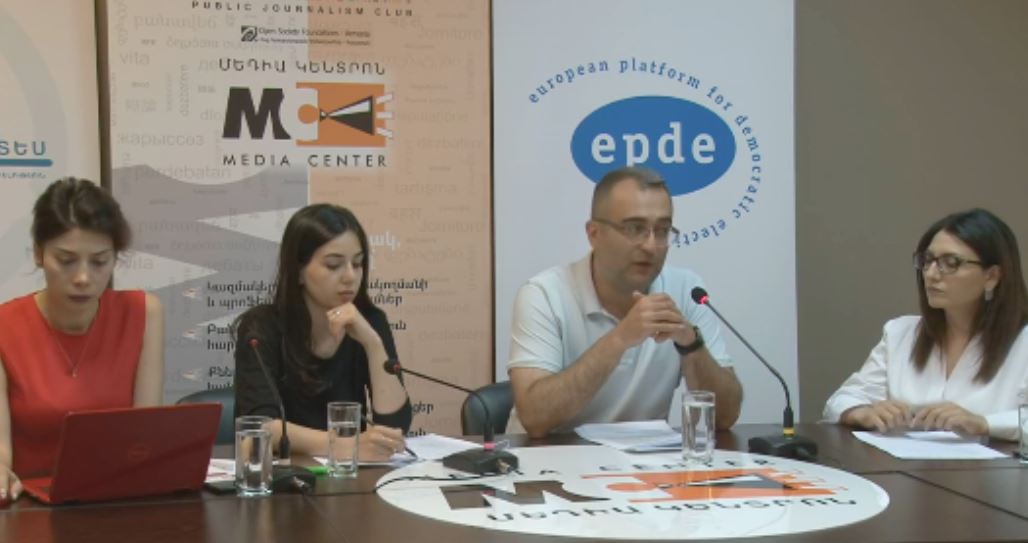On Sunday, Armenia will hold snap parliamentary elections. Today, two domestic citizen election observation coalitions presented their observation findings of the election campaign and preparations for the elections. You may find brief summaries of both press conferences below, full reports will be shared once finalized on the EPDE website and the websites of EPDE’s Armenian member organizations, Transparency International Anticorruption Center and Helsinki Citizens’ Assembly-Vanadzor, which are involved in the election observation missions of these coalitions. Below you may also find links to video recordings of the press conferences with English interpretation, as well as to a public discussion with leading Armenian political analysts reflecting on the election campaign.
Pre-Election Day findings – Akanates mission
The Akanates observation mission, which includes EPDE member Transparency International Anticorruption Center, notes that party campaign spending during early election campaigning is insufficiently regulated by the Electoral Code and that parties’ reports on their spending are incomplete during this time. The official period for election campaigning started 7 June, but campaigning started long before this. Observers were therefore unable to assess the true amount of campaign spending.
Campaigning and transparency of finances
The Electoral Code has clear regulations on campaign materials larger than 5 square meters, but materials that are smaller than this are not regulated. Parties do not clearly define the difference between campaign materials in their declarations, which makes it more difficult for observers to assess whether parties followed regulations and what the campaign spending was. In general, observers asses that many of the parties did ignore regulations on the placement of campaign materials (posters, billboards). Based on observers’ monitoring of posters and billboards used, an estimated 27 million AMD (approx. 44 000 Euro) of campaign spending has gone unreported.
Observers also note that regulations on what materials could be classified as “associated with a campaign” are not clear enough, which leaves room for hidden campaigning by individuals and may result in less transparency in campaign spending. Observers note this in relation to an advertising campaign by Robert Kocharyan for his new book release, which was criticized for being an indirect form of campaigning.
Regarding spending of election management bodies, observers assess that here also 27 million AMD (approx. 44 000 Euro) has not been declared for the real estate costs of the election headquarters, and for other human resource costs the amount of undeclared spending could be as high as 380 million AMD (approx. 622 000 Euro). Election management bodies have not provided any data on this, so this estimate is based on surveys and observer reports.
Vote bribing
Some instances of vote bribing were reported and these have been reported to law enforcement agencies, figures for this will be published at a later date as these are currently still being evaluated. There were also reports of “charity” activities conducted by certain parties, which is prohibited by the Criminal Code for election contenders from the day the elections are announced until the announcement of election results.
Misuse of administrative resources
There was a large number of incidents reported of misuse of administrative resources and the number and regional distribution increased the closer we got to Election Day. Cases were not necessarily linked with the state, but to local authorities and municipalities, and some cases were also reported of private companies campaigning for a certain party. The two leading contenders involved in misuse of administrative resources were the Armenia Alliance and Civil Contract Party.
Election Management bodies
The sessions of the Central Election Commission (CEC) were not broadcast live and decisions were reported to have been taken unanimously. The new CEC website offers space for parties to share their party programs, but very few parties took advantage of this (only four). Data shared on CEC does not fully comply with open data access as information is only uploaded in PDF format.
Observers raise concerns over the independence of territorial election commissions (TECs) as cases were observed where CEC staff were also members of TECs. Observers recommend that if further staff is needed in TECs that these should not come from CECs and that new staff should be employed.
The quality of trainings for TEC and precinct election commission (PEC) members was predominantly assessed as very high. IFES organized the trainings in cooperation with the CEC.
Hate speech
Observes note that the elections are taking place in a very sensitive post-war situation and that intolerance has become an issue. The level and use of hate speech by political contenders are unacceptable and is affecting the way citizens are interacting with one another as well. The acting Prime Minister has been particularly criticized for his campaign messaging, calling for vendettas against political opponents or members of the previous government.


















































